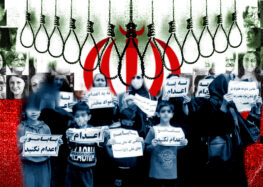Ebadi: Dutch Lawyers Could Have Shed Light on Bahrami’s Case Facts
In an interview with the International Campaign for Human Rights in Iran, Shirin Ebadi, the 2003 Nobel Peace Laureate and Head of the Defenders of Human Rights Center questioned the review process in the case of Zahra Bahrami, a prisoner who was executed last week. Ebadi told the Campaign that if, according to normal diplomatic protocols, the Dutch Ambassador had been allowed to visit with Ms. Bahrami, a Dutch citizen, and if the attorneys selected by the Dutch government had been allowed to review her case, many facts would have become clear for sure. But the Iranian government was not interested in clarifying these facts. Ebadi told the Campaign that Zahra Bahrami’s execution was carried out even in direct violation of the Islamic Republic of Iran’s own laws. Ebadi also said that this execution was a message from the regime to its opposition.
“Normally, when a death sentence is issued, it usually takes two to three years before the sentence is carried out. No [death sentence] case has ever gone to ‘Implementation Unit’ with such speed, leading to execution. This could be the signal the Iranian government sent its opposition and dissidents. The Iranian government is afraid that the civil protests of the people of Tunisia, Egypt, and Jordan could spread into Iran, so they decided to use these executions to issue a warning to its critics and to say that it does not intend to compromise under any circumstances, and that the people should not have any hope that they might see a day when the Iranian rulers might step aside,” Ebadi told the Campaign.
“I was shocked to hear about Zahra Bahrami’s execution, because her charges had not yet been reviewed. According to information supplied by the Prosecutor, she had two charges, one was participating in the Ashura Day protests, and the other, concealing and trafficking drugs. After she was arrested on Ashura Day of last year [27 December 2009], a few days later agents took her to her home and searched her house, and the officers then discovered that there were concealed drugs in the house. During a television show, Ms. Bahrami was forced to confess to crimes of ‘membership in a monarchist group,’ and ‘drug trafficking,'” head of Defenders of Human Rights Center told the Campaign.
“Her lawyer stated that Bahrami had been deceived, as the interrogators had promised her that if she admitted to her crimes, they would release her. Anyhow, this process was not normal, because when someone is arrested, if he has illegal pharaphernalia, such as drugs in his home, naturally, the first thing the house residents would do would be to destroy and remove the crime instruments. She was arrested on the street, and she was taken to prison, and later she was taken home, and if there were drugs in her home, this offered opportunities to the house residents to destroy it,” Shirin Ebadi added.
“In addition to her Iranian citizenship, Ms. Bahrami also held Dutch citizenship. The Netherands Embassy in Iran had requested to meet her, but the request was declined. Later, the Dutch Foreign Ministry requested for their lawyers to be involved in the case. Before receiving any reply to this request, the case got on its way, and since the sentence was carried out, the Iranian government naturally didn’t allow the Dutch lawyers to interfere, and this intensifies doubts that this was a political execution. According to diplomatic protocols, they should have allowed the Dutch Ambassador to meet with Ms. Bahrami as a Dutch citizen. If the lawyers appointed by the Dutch government were allowed to come and see the case, many facts would have definitely come to light, and the Iranian government was not interested in clarifying those facts,” said Shirin Ebadi about the Dutch government’s efforts.






